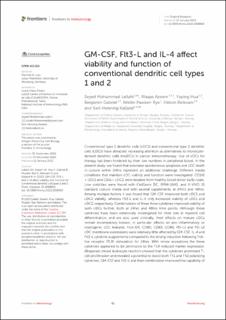GM-CSF, Flt3-L and IL-4 affect viability and function of conventional dendritic cell types 1 and 2
Lellahi, Seyed Mohammad; Azeem, Waqas; Hua, Yaping; Gabriel, Benjamin; Rye, Kristin Paulsen; Reikvam, Håkon; Kalland, Karl Henning
Journal article, Peer reviewed
Published version

Åpne
Permanent lenke
https://hdl.handle.net/11250/3068966Utgivelsesdato
2023-01-12Metadata
Vis full innførselSamlinger
- Department of Clinical Science [2318]
- Registrations from Cristin [9791]
Sammendrag
Conventional type 1 dendritic cells (cDC1) and conventional type 2 dendritic cells (cDC2) have attracted increasing attention as alternatives to monocyte-derived dendritic cells (moDCs) in cancer immunotherapy. Use of cDCs for therapy has been hindered by their low numbers in peripheral blood. In the present study, we found that extensive spontaneous apoptosis and cDC death in culture within 24hrs represent an additional challenge. Different media conditions that maintain cDC viability and function were investigated. CD141+ cDC1 and CD1c+ cDC2 were isolated from healthy blood donor buffy coats. Low viabilities were found with CellGenix DC, RPMI-1640, and X-VIVO 15 standard culture media and with several supplements at 24hrs and 48hrs. Among multiple factors it was found that GM-CSF improved both cDC1 and cDC2 viability, whereas Flt3-L and IL-4 only increased viability of cDC1 and cDC2, respectively. Combinations of these three cytokines improved viability of both cDCs further, both at 24hrs and 48hrs time points. Although these cytokines have been extensively investigated for their role in myeloid cell differentiation, and are also used clinically, their effects on mature cDCs remain incompletely known, in particular effects on pro-inflammatory or tolerogenic cDC features. HLA-DR, CD80, CD83, CD86, PD-L1 and PD-L2 cDC membrane expressions were relatively little affected by GM-CSF, IL-4 and Flt3-L cytokine supplements compared to the strong induction following Toll-like receptor (TLR) stimulation for 24hrs. With minor exceptions the three cytokines appeared to be permissive to the TLR-induced marker expression. Allogeneic mixed leukocyte reaction showed that the cytokines promoted T-cell proliferation and revealed a potential to boost both Th1 and Th2 polarizing cytokines. GM-CSF and Flt3-L and their combination improved the capability of cDC1 for dextran uptake, while in cDC2, dextran capture was improved by GM-CSF. The data suggest that GM-CSF, IL-4 and Flt3-L and combinations might be beneficial for DC viability and function in vitro. Limited viability of cDCs could be a confounding variable experimentally and in immunotherapy.
